Tagged: advice
How to Pull Yourself Out of a Creative Slump
- by Alyson Shane
Let's face it: even those of us who run our own businesses doing what we love for a living there are days where we feel more lukewarm than red-hot about it. It's normal! Not every day has to result in bubbly feelings, 110% productivity, and heaps of creative new ideas to jot down.
But what do you do when that dip in productivity becomes a lull... and then the norm?
This totally happened to me recently.
Don't get me wrong: my dedication to my clients hadn't faded, but my creative side - the side that feels like it shows when I write, for example - seemed to be taking a backseat to everything else that was going on in my life.
This is totally normal. It's normal for creative people to go through a dip in productivity, or a drought, but when you depend on your creativity to make a living there's a unique sort of pressure to get yourself together and get producing again.
With that in mind I wanted to share some of the steps I've taken to "get my groove back" so to speak, because you never know when a creative dry spell may occur:
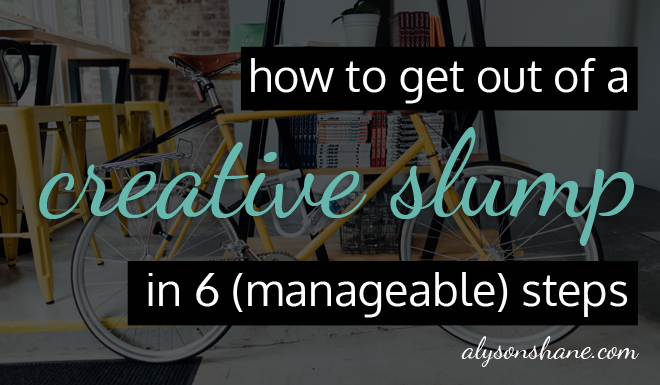
1. Acknowledge there's an issue
This is the worst. When you're in a creative slump it's easy to brush it off and say "I just don't feel like it right now!" or "I'll just get to it later" but you've got to be honest with yourself or you'll never snap out of it. You need to take a long, hard look at your screen (or canvas, or whatever) and admit: I haven't been working as hard at my craft as I usually do, and I need to snap out of it.
It's normal to feel guilty here; just let yourself feel bad for a few minutes... then let it go! The easiest way to make those guilty feelings go away is to do the thing that's making you feel bad, right?
2. Do it even if it sucks
The biggest hurdle to overcoming your creative slump is just sitting down to do the damn thing and not getting overwhelmed to the point where you're too in your head to produce anything of value. So what should you do instead? Sit down and create something of no value.
If you're a writer like me, do some free writing and experiment with different ideas, word combinations, and see what emerges; if you paint, just paint some stuff and let go of the expectation that it has to be your next masterpiece; you get the idea. Getting back into the habit of doing your craft will help you get back to feeling comfortable with it instead of intimidated and anxious.
3. Get active
When my anxiety flares up or I get super busy I'm the worst for letting my trips to the gym fall by the wayside. I try to go 2-3 times a week and I notice a definite slump in my mood, sleep, and creativity levels when I'm not exercising regularly. Recently I "scheduled" GAINZ time into my calendar Monday, Wednesday, and Friday mornings; that way it's just scheduled into my workday.
On days when I can't make it in the morning I try to go in the afternoon, but if all else fails I make a point to go for a walk, ride my bike somewhere, or do yoga at home (I'v also started doing this 10-minute yoga flow video in the afternoons to clear my head - it works, I swear!)
4. Read
Like I said, I've been struggling with a creative slump recently and when I sat down at my laptop today I hadn't intended to write blog post. I've been struggling to write consistently recently, but I still spend a lot of time online reading articles about a wide variety of topics because 1. I'm a voracious reader and 2. I have to in order to stay on top of my game professionally.
In any case, a few days ago John showed me a terrific series of posts on Derek Sivers' blog, one of which is called How to Be Useful to Others. One of the points goes as follows:
3. Share strong opinions.
Strong opinions are very useful to others.
Those who were undecided or ambivalent can just adopt your stance.
But those who disagree can solidify their stance by arguing against yours.
Even if you invent an opinion for the sole sake of argument, boldly sharing a strong opinion is very useful to others.
While it didn't really strike me at the time, those statements have been gnawing at me for a few days and were one of the things that inspired me to sit down and start trying to work past my writer's block. However, you can read whatever inspires you in order to get your spark back: novels, autobiographies of people you admire, or even some articles on Hacker News - whatever leaves you feeling inspred is stuff you should actively be seeking out and reading (or re-reading).
5. Write it out
Sometimes when I find myself struggling to put my thoughts to paper I do "free writing" session. Free writing is a technique where you literally just write whatever comes to mind without stopping to correct spelling, grammar, or focusing on a specific topic.
After reading the aforementioned Derek Sivers article I started typing... and oddly enough the bare bones for this post started to emerge. I wrote about feeling anxious about not writing as much, and as the words appeared on my screen I realized that I was stuck in a cycle of guilt over not creating which was actually stopping me from doing it.
I find this technique is especially helpful before I start writing something a bit more technical (like one of these blog posts) because it really clears out whatever's floating around in your head. Often whenever I find that I'm stuck on an idea or problem a little free writing clears out that mental clutter in no time!

6. Watch & be inspired
I don't usually work with the TV on, but sometimes when I need a little creative background noise (like right now) I'll pop the TV on in the background and half-watch while I work on something. I find that it's best to put on something a bit soothing or slower-paced because watching stuff like action movies can be distracting (hint: don't try to focus on your craft while watching Deadpool).
One of my favourite shows is Chef's Table (it's available on Netflix - go binge-watch it when you're done reading this post!) because not only is it beautifully framed and shot, it also interviews highly creative people who have completely dedicated themselves to their craft and it's pretty impossible to not feel inspired while watching it.
Do you have any tips for getting that creative spark back? Tweet at me or tell me in the comments!
6 Ways Your Small Business Can Save Money
- by Alyson Shane
Recently I received a phone call from my alma mater asking for donations to their Faculty of Arts, where I studied when I received my BA. She asked me for $5 a month, or "the cost of a single Starbucks coffee" (well played, University of Winnipeg, well played).
I'll be honest with you: I declined to give back to the university for the time being. My business is still in it's infancy, and saving money is pretty important to me right now. However, this conversation got me thinking about the ways I work to keep costs low for myself during this stage (even if that means saving that $5 a month), and I thought I'd share some of the things I've learned:
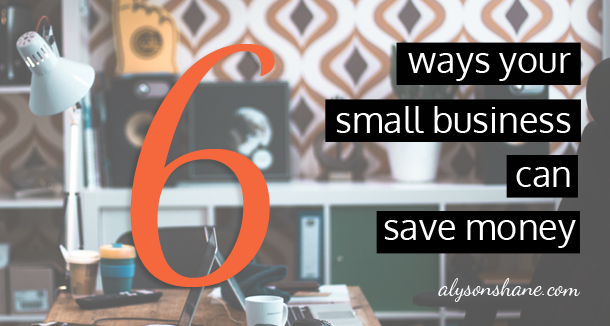
One of the most interesting assumptions that people have started to make about me since I began running my business is that this is the lifestyle I lead:

This is, much to my chagrin, not how I live my life. In fact, it's a little more like this:

Don't get me wrong, I'm doing just fine financially, but I'm not baller status quite yet. As a result, here are some of the areas where I cut costs or try not to indulge in order to keep my business expenses low:
Buying or renting space you don't need yet
One of the easiest ways to save a few hundred dollars a month (minimum!) is to avoid buying a brick-and-mortar store or renting office space for as long as you can. This, in my opinion, is the single biggest benefit to working from home.
Sure, there are benefits to an office or renting a desk in a co-working space, such as access to a board room, printing area, etc, but unless your business has grown to the point where you need those things on a consistent basis, having client meetings in coffee shops should be fine for now.
Spending on expedited shipping
Unless it's a business emergency (ie: your business will shut down without this parcel/package) you can wait the extra day or two.
Additionally, if the shipping charges for a particular item are outrageous, ask yourself: do you really need that beautiful embossed day planner that badly? Odds are, you probably don't.
Custom website design
I get it: you want to build a website that stands out from your competitor's. You want something that is completely yours, and is an accurate online representation of your business and your values.
However, what's more important is simply having a website, rather than worrying about whether or not it's built custom from scratch. Many people choose to work with existing Wordpress or Squarespace templates, which are easy to alter and personalize without the investment in a custom designed site.
Unnecessary advertising
I'm a firm believer that the best thing a person or business can do for themselves is to start to build a positive reputation for themselves online. What's great about this is that social networks like Facebook, Twitter, LinkedIn and Pinterest (the biggest and most popular ones for businesses) are all free to join.
This means that if you do hustle a little bit (or hire someone like me #ShamelessPlug) you can start to build a name for yourself and your services without having to invest in paid advertising just yet.
Not only does putting off doing paid advertising beneficial because it keeps costs low, but people will appreciate that you're connecting with them on a real, human level, and not just sending a barrage of ads their way.
Office supplies you don't need
Confession: I LOVE going to stationery stores. Every time I step into Tiny Feast here in Winnipeg my heart starts going pitter-pat and I start imagining how charming my desk would be with all those fountain pens, notebooks, staplers... you get the drift.
As much as I would love to take everything from Tiny Feast home with me, I have to ask myself: how often do I use a stapler (never), how often do I use paperclips (also never), do I really need a handmade mug to store my pens (not at all)... you get my drift.
As tempting as it may seem to try and pimp out your desk with heaps of Pinterest-worthy goodies, resist the temptation for now. You can always indulge in that gorgeous cork-top desk in the future.
Subscriptions for software you don't need
This one always gets me. I pay for a few subscriptions to various content scheduling and monitoring services (HootSuite, Buffer, etc) and it sucks to pay the monthly fees... but without them I would go absolutely bonkers and not be able to manage my shit. So, for me they are a necessary evil.
However, unless you're in the digital marketing business odds are you can avoid a lot of these monthly expenses by using free software to do what you need. Some great options are:
- Insightly (CRM system)
- Freshbooks (accounting)
- HootSuite or Buffer (free versions - social media management)
- Toggl (time management - I'd be lost without this tool)
- Trello (project management)
- Dropbox (file sharing)
It may seem tempting to invest in expensive software, or to buy a bunch pf products up-front "just in case" but if you aren't using the tool on a daily basis, and if it isn't something that your business can live without (eg: I would be utterly lost without Buffer, for example) then consider sticking with the free version, or finding a free alternative until the time comes when you either a) need the service enough that you should pay for it or b) you can afford to invest in it.
Do you have any money-saving tips for small businesses? Is there something that you wish you had learned when you were starting out? Tweet at me or tell me in the comments!
A Guide to Working Your Side Hustle While Keeping Your Day Job
- by Alyson Shane
Let's face it: there's nothing worse than feeling like you're stuck in your job.
I'll be honest with you: I was pretty unhappy at my old office job, and the biggest thing that kept me going there day after day was knowing that I could go home and work on my business.
Knowing that I could go home and pour my energy into something personal that mattered to me kept me going on a lot of days when I wanted to throw in the towel.
However, whether you're building your biz on the side, hustling your freelance gig, or working on other creative projects, it can still be tough to be able to put the effort in when you spend the bulk of your peak productivity hours at the office.
If you're serious about accomplishing your goals outside of your 9-5 then it's time to start planning, getting organized, and taking steps to make the most of your out of office hours.
Luckily, I just went through this experience, which is why I'm here to help:
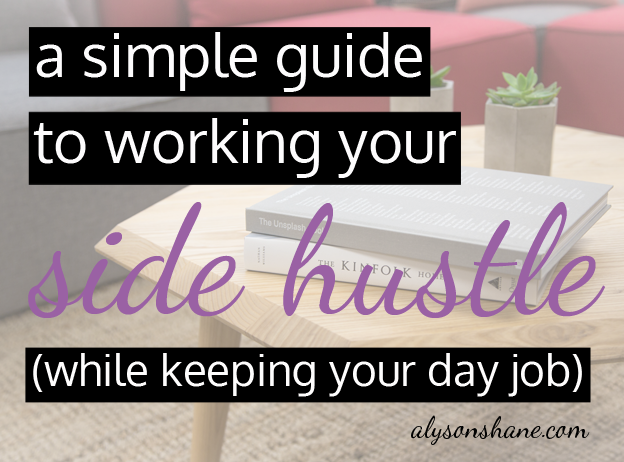
Figure out how much time you have (and be honest!)
So we already know that you have -40 hours a week to work on your side project, but it's also important to factor in other important areas of your life that can't be avoided and take up your time. Some of these can include:
- Commuting to and from work
- Going to the gym/general fitness
- Preparing and eating meals
- Socializing
- Sleep
The easiest way to figure out how much time you really have is to map it out so you can get an accurate look at how much time you really have, and how much time you can realistically spend each week.
I know that a few hours here or there may not look like a lot, but don't get discouraged! Make every hour count.
Plan, plan, plan!
Your time is limited, and if you're working on a particularly large goal, or something with lots of steps to complete it can feel like an impossible task to fit it all into your after-work hours. Don't sweat it, baby, it can be done! It just takes a little planning and preparedness.
The first thing you need to do is figure out what your goals are. They can be as vague or as specific as you'd like, but the most specific you can be, the better.
Some examples are:
- Write and publish an ebook
- Redesign and launch your website
- Put together an e-course or workshop
- Hustle your side business and grow your client base
These are all top-level goals: they're the end result, but to get there will take lots of smaller, much more manageable steps. What I used to do was sit down on a weekly or bi-weekly basis and figure out what I wanted to work on that week, and focused my attention on competing those tasks.
Prioritize and re-assess often
Once your top-level goals are in place and you've mapped out how and when you'll be taking steps to get there, it's time to prioritize your time. When you're doing lots of stuff and living a busy life it can feel hard to know what to start with (believe me!) so I find it's helpful to determine what "priority" tasks are. This is what mine look like:
- Client work and tasks that generate income
- Time-sensitive tasks, or tasks on a schedule (my newsletter, for example)
- Work that needs to be sent to someone else so they can move forward on their end
- To-dos on my business development goal list
It's important to take this seriously! It's way too easy to get wrapped up in small details, or to waste your time on something that doesn't really matter. Remember: your after-hours time is at a premium, so treat it that way.
Schedule similar tasks together
After a long day at the office it may feel like it makes more sense to say, write a blog post one night and draft your newsletter the next, but practicing "batch scheduling" can help you optimize your time and get more done.
"Batch scheduling" is exactly what it sounds like: grouping similar tasks together to optimize your time. This is especially important when doing tasks which require you to get into a "flow" such as writing or other creative pursuits. It takes time to get in and out of flow, so it makes more sense to group similar tasks together so you can stay in that mindset as you move from one task to the next.
It's also important to try and schedule your after-work work on nights when you aren't feeling mentally worn-down. You probably won't feel like sitting down and working on your financials after a busy day of meetings at the office, for example, so try to schedule mentally taxing tasks on days when your 9-5 is more low-key, and vice-versa.
Take time off
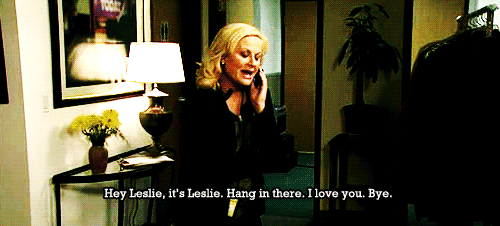
When you're hustling on the side of your 9-5 it's really easy to fall into the habit of working 24-7 (trust me on this one, I know it all too well) but if you don't schedule in time to rest and recharge your batteries you will burn out. Not only will your side projects begin to see the strain, but your productivity at your 9-5 will begin to slip as well, and that's not good!
With this in mind, schedule time to catch up on the latest Game of Thrones, go for a hike with your friends, or basically do something that isn't working on your side project when you're not at work.
Taking the time to look after yourself ensures that you'll have the steam to keep firing on all cylinders, both at your 9-5 and at your side gig, for a long time.
Do you have any tips for working on your side hustle while keeping a day job? I'd love to hear them!
Being a Small Business Owner: 5 Things You Need to Know
- by Alyson Shane
Today I did a "big kid" business owner task and complied all of my information to send to my accountant for tax time. It was stressful, a little bit chaotic, but ultimately felt good to be done and over with.
The reason it took me so long (and caused me more than a little anxiety) is because when I started my business a year and a half ago I didn't expect it to scale so quickly, and as a result I kind of floundered through the first few months of it without real systems in place to help me stay organized.
Now, boy do I know better.
Largely what I know has come through trial and error, but I've also had some great discussions with friends, colleagues, and mentors who have helped me figure this stuff out and get on the right track. And, since sharing is caring, I figured I'd share a list of 5 of the most important thins I've learned with you:
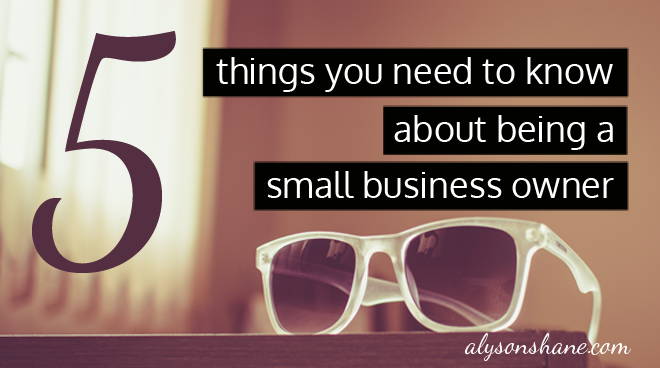
1. Every day is unpredictable
This is probably the biggest understatement of the century! I do my best to be as organized as possible and use checklists and planners, but sometimes a client throws a curveball my way which eats up my entire day.
As a result, I've had to learn to be a lot more flexible. Not just with my time, but with my expectations of what I planned to accomplish during that time. Clients will often send pressing need-to-handle emails moments before they actually need something, or someone will call me while I'm in the middle of writing an in-depth piece, or any variety of things. Whatever the case, be prepared for the unexpected.
2. Developing your systems early on is a lifesaver
Believe me, you'll thank yourself later. Like I mentioned at the top of this post, when I first started freelancing I didn't give much thought to how my folders were organized, where my invoices went, how I tracked my time... you get the drift.
Do as I say, not as I do. Here are some tips to develop strong systems:
- Pick a file structure and stick to it. Be consistent in your folders and sub-folders!
- Use invoice numbers to keep track of your invoices, and use a spreadsheet to track what's outstanding and what has been paid (I recently started doing this thanks to a conversation with my friend Elise and it's a lifesaver)
- Track your time. I use Toggl to keep track of everything I'm doing, and review my logs often to figure out what I'm spending the most amount of time on.
- Use the heck out of your calendar.
3. You'll think about work constantly
When you own something and you're trying to build it, it's almost always on your mind, and that's totally okay!
In fact, it's probably the thing that is going to make you successful and keep your business from going under, because if you're always thinking about it, then you're more likely to come up with new ideas, systems to streamline your processes, and ways to hustle your product or services.
I'll be honest: if you're the kind of person who wants punch the clock and then forget about everything you did Monday to Friday, then this isn't the lifestyle for you.
4. You'll always have stuff to do
This can actually feel overwhelming from time to time, because even when I've checked off all of my client "to dos" there's still a long (looooong) laundry list of things that I need to take care of to make sure my business is running smoothly. This could be anything from developing new products, to researching a new social trend, to filling up my content calendar... there's never a dull moment.
There are definitely times when this can feel overwhelming, but that's totally normal! Just take a deep breath, grab a glass of wine (or whiskey), pump some music and push though the first few items on your to-do list. Trust me, once you've checked a few off you will feel a million timed better.
5. You'll feel guilty when you "switch off"
(but do it anyway)

It's important to have rest days and days where your eyes aren't glued to your computer screen, or you don't set foot in your store (if you have a brick-and-mortar business) because - trust me on this - you will burn out, honey. Even if you can't entirely unplug, set aside a few hours of "me time" and take a bath, hit the gym, grab a greasy burger with your besties... whatever you need to do to unwind and recharge your batteries.
When I was on vacation in Central America for three weeks I definitely had bouts of "oh my god, will my business be there when I get back?!" but you know what? Being away from the day-to-day tasks helped me come up with some really terrific ideas, and when I came back I felt 100% refreshed and ready to dive headlong into things. I highly recommend vacations, even short ones, specifically for this purpose.
The truth of the matter is that there are a million other things you "need to know" about running a small business (which I'm sure I'll get around to blogging about at some point!) but what it really boils down to is that it's a crazy, intense, rollercoaster of fun, stress, and good vibes.
All my luck to you in your small biz adventure!
Want more posts like this? Tell me what you'd like me to blog about next on Twitter, via email, or in the comments!
4 Easy Ways to Reduce Your Blog Bounce Rate
- by Alyson Shane
Whether you blog for yourself, your business, or your employer, minimizing your blog's bounce rate should be a top priority. Readers who click on your site are much more likely to come back than the ones who don't, so managing your bounce rate can go a long way towards building your audience.
If you haven't heard this term before, your blog's bounce rate is the percentage of visitors who arrive on your site, stay on one page, and then leave without clicking around.
This might not seem like a big deal - after all, if they clicked on a link you shared to get to your site, then didn't you accomplish your goal? Well... sort of.
Why is your bounce rate important?
If you run a blog simply for the sake of writing about your life or your interests, then maybe your bounce rate isn't that important to you.
But if you're anything like the millions of bloggers, artists & creatives, and businesses who feature a blog as a single section of a website designed to sell a product or service, then making sure that your site aims to encourage users to explore your site should be a top priority. You don't want them to visit your blog without looking at everything else that you have to offer, do you?
What is a "good" bounce rate?
According to this article, most websites will see bounce rates fall somewhere between 26% and 70%, so as long as you fall within that range, depending on what you do and the purpose of your website, you should be okay.
The same article cautions that a bounce rate below 20% or over 90% is usually a bad sign. The former hints at a problem with the analytics setup, the latter with the website. If you've never taken a look at your bounce rate before, you can find it in Google Analytics (which you should have installed!)
How can you reduce your bounce rate?
I'm glad you asked! It's not as difficult as it may seem, and with a few tweaks and adjustments, your blog will soon be converting like crazy.
Below are four easy ways to spruce up your blog, make it visiting better experience for your audience, and to reduce that bounce rate:

1. Improve your site's speed
Sites that load slowly are my biggest pet peeve! There's nothing worse than waiting for a website to load, or (even worse) try to navigate one which keeps refreshing because the image files take longer to load than the text (I'm looking at you, every single Huffington Post article).
If you're like me the most likely culprit is huge image files or lots of videos; I just did a speed check and managed to get my speed up by 60% by resizing just three photos. Oops. Now my website loads faster than 79% of all tested websites on pingdom.com.
Want to see how quickly your site loads? Punch your URL in here and take a look!
2. Use a clean, easy-to-navigate design
Remember when the internet looked like this?
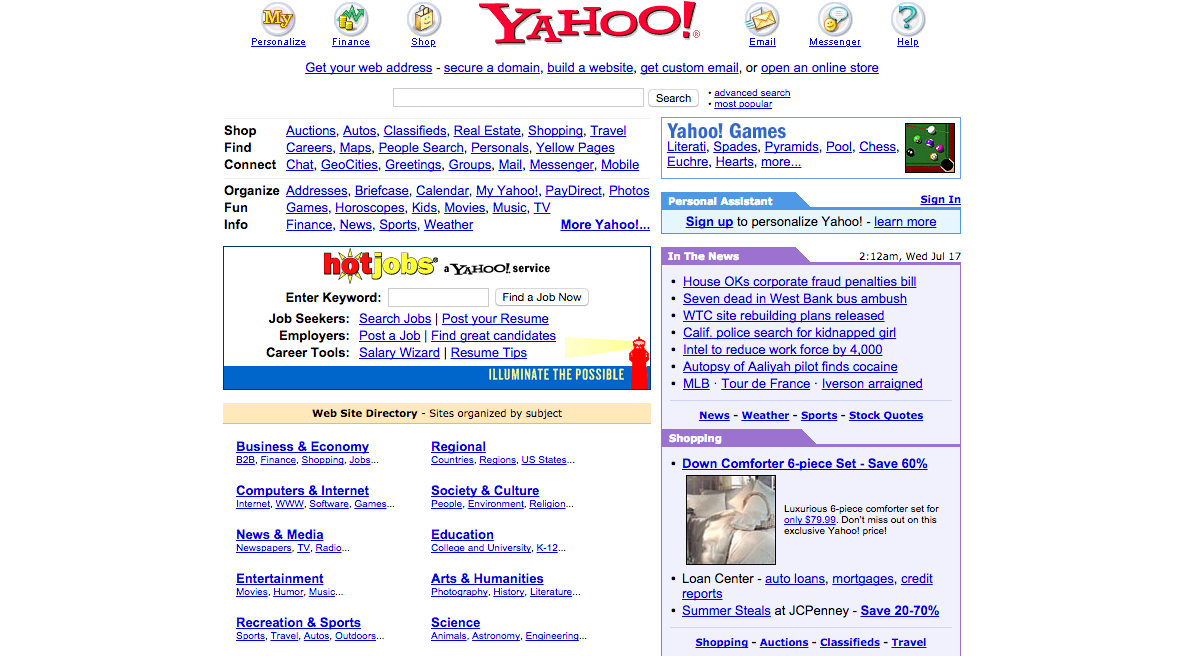
My eyes.
Unfortunately, many websites still look a lot like this, with people trying to cram too much information onto a page at once, providing a visually unappealing and difficult to navigate and read experience for a first-time visitor.
Your website should be designed to move your readers on a journey through your site (generally called a "sales tunnel" but the same idea applies whether you're selling something or not), from the first post they read to other important areas, such as your newsletter signup page, contact form, or online store. If you're struggling to cut back on the content on your page, make a list of the most important parts of your site (e.g., your blog, your About page, your services page, etc.) and try to remove links that don't lead visitors to those areas.
Also, this should also go without saying, but you should also make sure that your site is mobile responsive (aka that it resizes to fit the width of the screen on a mobile phone). Trying to read and navigate a website which hasn't been optimized on mobile screens is a nightmare, and is one of the easiest ways to make sure that first-time visitors to your blog never come back.
3. Keep your content relevant to visitor's needs
What do you blog about? Take a look at the posts you've written recently, and then take a look at your Google Analytics. Are the search terms that are leading people to your website the same ones that you're writing about? If not, then it's time to start honing your content strategy, and then to start paying attention to how you use your headings and subheadings.
Not only does using proper headings and subheadings make your posts easy to read and understand, but it also helps boost your search engine rankings. This is because sites like Google pull information about your page based on what's in your H1, H2, H3, etc., and will help make sure that the people arriving at your site are coming there for the information that you're providing.
4. Link to related posts
One of the easiest ways to reduce your bounce rate is to offer your readers with more to do on your site once they've finished reading. Most bloggers (myself included) just add a footer to the bottom of our posts which recommend posts in the same or similar categories. Adding this at the end of a post is an easy way to entice your new visitor to explore more of what you have to say.
In addition to the footer trick, I also organize my posts into categories so my readers can quickly browse all of the posts I've written on a single topic.They can also browse posts by category and by month and year, and see a list of the most recent posts I've published on the right-hand sidebar.
Try experimenting with your layout and see how you can entice your visitors into exploring of your blog content!
That's it!
By making these changes we've not only managed to increase your blog's look, feel, and navigation, but we've also made sure that your visitors who care about your content can find you, and that your site's slow response time doesn't drive them away before they get through the first paragraph of your latest post.
Have you had issues with high bounce rates? If so, how did you solve them? I'd love to know!
In My Community: Speaking to Red River College's Creative Communication Students
- by Alyson Shane
Earlier today I had the pleasure of speaking to students in their first year of the Red River College's Creative Communications program (aka #CreComm) about the state of social media, blogging, and the future of digital communication with my longtime internet pal Liz Hover.

(Really digging my Neil DeGrase Tyson hands in the bottom left, by the way)
This is actually my fifth year returning to speak to students in the program (my first time was in 2011 - how time flies!) and every year it gets better; not just because I get to see new faces and have brand new discussions, but because as my life has changed I've become better suited to be able to speak on these topics, going from a university student, to a university graduate, to being employed full-time and finally to running a business where I literally blog and do social media all day.
As usual, we didn't have enough time to cover everything that I wanted to speak about, so I wanted to cover a few topics that didn't really wrap up during my time with the students today.

Merging My Personal Brand & Business
I started off as a lifestyle blogger in 2003, back on LiveJournal, and spent a number of years blogging rather aimlessly and not with a lot of purpose. I blogged frequently, sure, but it was usually just about what I'd done on the weekend, or a video I liked, or whatever.
What I had at the time was a strong personal brand, but as I started to think more critically about my craft I wanted to write about my weekends less and less, and about social media, content marketing, and being a business owner more and more.
Blogging for my business gives my blog a sense of purpose, and has provided me with a theme to tie together a lot of topics and ideas which would have seemed weird to write about as a lifestyle blogger.
During our talk Liz turned to me and said "I like your blog now; you seem a lot more happy and positive" and that's because I am. My lifestyle blog chronicled a time in my life where I was largely unhappy and trying to figure myself out, and as I've grown, learned, and gained happiness and confidence as a result of running my business it's translated into what I write here on my blog.
It's totally okay (and normal, and expected) that your blog will change and grow as you do over time - that's okay! We're in a constant state of self-discovery, and our blogs and websites should be a reflection of that.
On Having Anxiety & Being Open About It
One of the things that we touched on in the class, and which several students asked me about afterward, was how I dealt with being an anxious person, and what led me to decide to share some of my personal struggles with my audience when some of them could be potential clients.
I first wrote publicly about my issues with anxiety for Bell Lets Talk Day in 2015. The post is called Living With the Mean Reds and it was one of the most popular posts I've ever written. Since then I've blogged about my progress, which apps I've used to help manage it, and even written about my falling-out with my family, and creating a family of choice to move forward in positive and constructive ways.
None of it is easy to write about, and one of my other family members cautioned me that writing about this side of my life may actually alienate potential employers or clients. My response to that is: if having anxiety or issues with my family stops someone from wanting to work with me, then we wouldn't have been a great fit anyway.
I'm going to do what I want and the kinds of people who respect and appreciate what I have to say will find me and want to work with me. It's worked out great so far.
Besides that, as our digital world becomes less and less private, the onus is on us as individuals to take the time to craft the narratives we want about ourselves online. Sure, you can't control what other people say (remember The Dirty? Omg) but going out of your way to craft your own narrative is an important part of creating your personal brand because even though we like to paint pretty pictures of ourselves online we all know deep down that there are hard times and dark days, and part of being an authentic and relatable human being is being honest with yourself and your audience about your struggles, even if that's challenging sometimes.
What If Blogging Isn't Your Thing?
Creative Communications students have to blog as part of their curriculum, and during our talk we touched on the fact that - let's face it - blogging may not be for everybody. Which I agree with; writing isn't easy for some people.

However, I do think that it's important that young people who are entering job markets which require them to be creative (eg: digital marketing, advertising, public relations, etc) should make a point to find a way to express themselves creatively online in a way that they can point to in an interview and say "this is mine."
Blogs also don't have to last forever. My good friend Luke is running year24.com a blog about (you guessed it) his 24th year. This project is on the easy side because he set the parameters himself, and there's a concrete start and end date. What matters is that he made a decision to do something creative and challenging, and was successful in doing so.
But maybe you really hate blogging for yourself, and the idea of holding a camera not attached to your iPhone scares the living daylights out of you. What can you do?
There are a variety of things: start a killer Instagram account about your pet like Liz did; reach out to publications online and start writing for them (one of the very first places I was published online was The Spill Magazine, for example); start interviewing local business owners that you admire and compile them on a website; create and grow a killer Pinterest community; you get the drift.
What matters is that you demonstrate that you're constantly learning, looking for new challenges and opportunities, and can present what you know in a fun and accessible way. The sky is really the limit!
Want More?
Do you have questions about blogging, social media, or how the heck I got to where I am?
Are you a teacher interested in having me visit your class to speak about blogging, social media and digital marketing to your students?
Drop me a line! I'm always happy to have a quick email exchange, a lunchtime chat, or even an after-hours pint at the Yellow Dog. Looking forward to hearing from you!
*As always, thanks to Kenton Larson at Red River College for having me!
How to Take a Real Vacation While Running Your Own Business
- by Alyson Shane
With my Central American vacation extravaganza coming up tomorrow (gulp!) , I've been experiencing a higher than usual degree of anxiety around my business. This will be the first time that I'll really be "away" from my work in any real capacity, and I'm starting to realize why only 9% of the 200 business owners interviewed in a survey by OnDeck allowed themselves to take a full two-week vacatio.
This is really distressing news! Relaxing and taking a break is crucial to being productive and happy, and it provides much-needed downtime away from all the screens and stresses of everyday life. Even better, with recent advances in technology business owners can work from virtually anywhere, meaning that they can check in and give themselves peace of mind that their hard work isn't crumbling to pieces while they're on the beach.
However, in order to go away on a vacation and not lose your mind, there are a few steps that you can take to help alleviate anxiety and keep things running properly while you're away. Here are some which have helped me:

1. Have someone you trust step in for you
If you manage a business with a few employees, then speak to one of them about handling some of your more pressing duties. Having someone that you trust, whom you know can handle themselves in a crisis and won't burn your business to the (figurative) ground will go a long way towards making sure you aren't stressing out the entire time you're gone.
In my case, I'm getting someone I trust to handle my client's accounts while I'm away. I've planned out as much content in advance as I can, and made my clients aware of a very strict cutoff date for info pertaining to pressing ads and marketing campaigns, so that way all that person has to do is a bit of community management (ie: replying to Tweets and comments as needed).
2. Communicate your expectations
If you run a service-based business like I do, communication is key. This is great day-to-day advice, but is especially applicable when you're about to go away on vacation. Keeping your clients or customers in the loop goes a long way towards building trusting relationships, and helps set their expectations as to what you can reasonably do while you're away.
To illustrate: last week after the holidays ended I sent all of my clients an email with a friendly post-holiday message, and a reminder that I'm going out of town. Now they know the exact dates I'm leaving and returning, as well as the final submission date for any content they need created or scheduled. I also asked them to think of any upcoming events or promotional opportunities, and to let me know ASAP so I that I can plan ahead to make sure nothing gets missed.
I also let them know that, while I will be checking my email from time to time, I'll be in the jungles (or beaches!) of Central America and have no idea what the wifi will be like, so it may take me a few days to respond. By communicating expectations in advance, both parties know what to expect.
If you have employees, make them aware of what you expect them to do while you're away. Having a checklist or defined list of tasks and goals can go a long way towards helping them stay motivated in your absence, and defines clear expectations so there's no confusion.
3. Set boundaries
The point of a vacation is to peel yourself away from your screen.
As someone who literally makes their living online, I know that I'm going to struggle to not keep my face buried in my iPhone screen the entire time, and honestly this is giving me some anxiety.
I'm lucky that a lot of the places we're going will probably have pretty slow, spotty wifi, which will help force me off my phone, but if you're going somewhere with a strong connection, like a resort or somewhere that isn't in the middle of the Guatemalan jungle, then setting rules like "I only check my email in the morning over coffee" can go a long way to keeping you sane.
Not just that, but having a rule for when you "check in" can also help your clients and employees (if you have them) know when to expect to hear from you, and when the best time to get in touch with you will be.
4. Use collaboration tools & group chats
There are a variety of collaboration tools online such as Slack, Asana, Evernote, BaseCamp, and Trello (my personal fave) which you can use to stay in the loop about various projects and opportunities. By making the most of these tools you can communicate and catch up with your team or clients quickly and effectively, leaving more time to hang out and relax.
In the event of a crisis, tools like Google Hangouts and Skype are great for having a quick chat to solve the problem. This can work great for employees who are stressed out during a crisis, or a client who is having a meltdown while you're on another continent.
How do you keep from going crazy when you go away on vacation? Tell me in the comments!
3 Things to do Before Breaking Out on Your Own
- by Alyson Shane
Well, I made it.
It's 2016, my business hasn't fallen apart, and my life didn't somehow implode in on itself. Yay!
Without a doubt, starting my own business and making the transition from being a full-time employee to a full-time business owner was scary as hell. There isn't really a "right" way to make the jump, and there aren't really a specific set of steps that you absolutely 100% must take in order to do it. However, there are a few key things to keep in mind before you break out on your own, which I want to discuss in this post.
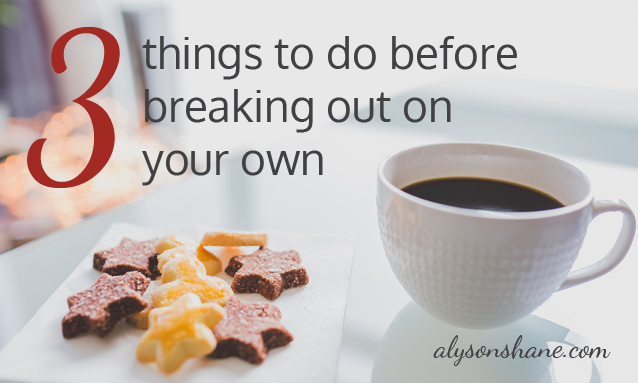
Why do I want to talk about this stuff? Because sharing is caring, and because I was lucky enough to have a wonderful and very clever guide (my boyfriend, John) who helped me navigate a lot of hurdles and helped me prepare for this experience.
Not everyone starting their own business is fortunate enough to have a John in their life, so here are a few things he taught me which I think will help you out if you think that running your own business is the path that you want to take:
1. Start Hustling Early
I got my first client a full year before I started working for myself full-time. Honestly, it happened by accident (I met a guy I knew from Twitter at a party who introduced me to his friend who needed a copywriter) and it wasn't for much, just a few copywriting articles each month. It didn't make a lot of money off that first client, but the experience of working with someone for a while helped me start to understand the dynamic of different kinds of working relationships which were different than the boss/employee relationship I was used to.
Also, starting small has allowed me to scale my business in a manageable way. I've acquired a handful of regular clients who I work with on a monthly basis, as well as some copywriting work, and one-off contracts for special events or websites as they come up.
I should also point out that I have been extremely lucky. What happened to me isn't always the case, and it's not realistic to assume that just because you go into business for yourself, that clients will start pouring out of the woodwork right away.
Not just that, but securing an ongoing contract (if that's what you're looking for, some businesses operate on a per-contract basis) often takes time. The process from the initial email or meeting to signing a contract can take months to happen, or never materialize at all.
By starting to build a client base early, you can get a feel for whether or not running your own business is actually what you want to do before you jump feet-first into doing it. Also, leaving your secure 9-5 knowing that you already have a handful of contracts to take care of your living expenses goes a long way in helping make the transition less scary. Trust me on this one.
2. Buckle Down
Assuming that you're working a 9-5 job in addition to building your business, you're going to be insanely busy trying to juggle both before breaking out on your own. Get used to it.

Before I left my office job I was working most weeknight evenings from 6-11 or 12, and spending a lot of time working on the weekends, as well. If you're trying to build up a decent client base to help you make a smooth transition, then obviously any time spent doing that work needs to be done outside of regular office hours (unless your boss is cool with this, which most aren't.)
If you want to work for yourself, you need to get ready for a very imbalanced work/life lifestyle for a while. Not just before you leave your 9-5, but afterward, too. To illustrate: I'm writing this on a Sunday evening, after working all day since I got up. I've also been on "holiday" since Christmas Eve, but have spent at least 5 days of my 10-day 'holiday' working for the majority of the day (who told you that running your own business was glamorous?)
What's crazy is that what I just illustrated isn't that uncommon; lots of people I know work even more than I do! But when you run your own business you're the only person responsible for generating your own income, and the sooner you get used to working aggressive and unusual hours, the better.
3. Save Up
Without a doubt the most terrifying thing about working for yourself is the transition from going to having a regular paycheque which is deposited into your bank account every two weeks, to one where your financial situation is in a state of flux.
I try not to talk too much about my financial situation, but in the interest of learning from my experience, here's how I managed to get myself into a relatively good position:
When I got my first contract (the small copywriting one I mentioned earlier) I used it to start paying down my credit card debt and the student debt that I'd acquired while in university. As I picked up more clients and started to think more seriously about running my own business as an option, I started splitting my additional income (ie: the money I was making above what I was paid at my office job) between paying down my debt and putting it aside in a nest egg.
Having a nest egg allows me to not freak the hell out when a payment is late (which happens) because I still have a float to live on for a while. Honestly, this "float" is the key to running your own business and not being in a constant state of panic. This all changes when you start bringing subcontractors and employees into the mix, of course, because they have to be paid before you do, but that's a whole different kettle of fish (and anxiety) that we won't go into here.
One last thing about money: get your taxes in order. If you live in Canada and you run a business making over $30,000/yr you must register for a General Sales Tax (GST) number. Dealing with the Canada Revenue Agency is a hassle (believe me) but if you aren't filing your taxes correctly you can wind up owing tens of thousands of dollars. Speak to your bank or accountant, if you've got one, and make sure you're covered.
Do you have any tips for people thinking about breaking out on their own? Tell me in the comments!
5 Things to Let Go of in 2016
- by Alyson Shane
Okay, I know how cheesy these posts are, but bear with me!
I've had a transformational 2015: I started running my business full-time; I started a second business (more on that soon!); I was awarded a TechFutures Grant; I met so many amazing people and had experiences that the Alyson of 2014 wouldn't have had the guts or ambition to go after.
I also know that there will be tough years ahead, sometime in the nebulous, unknown future, which is why it's important to reflect and consider the things to improve on, and the things to let go of.
With that in mind, I'd like to share my reflections some of this stuff with you guys:
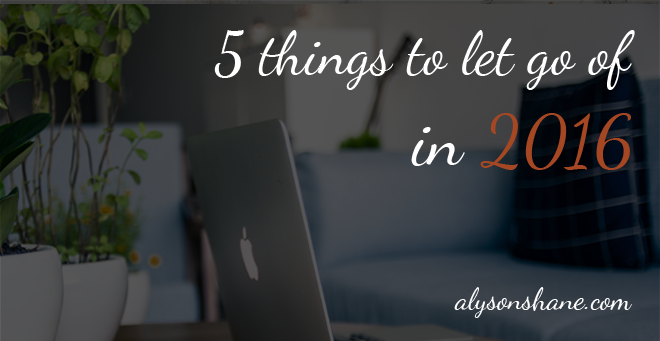
1. Let go of everyone's opinions of your life
There are always going to be people who are going to give you their opinion of how you should be living your life, and that's okay. However, you need to keep in mind that there's no one "right" way to live, and that happiness can mean a variety of things for a variety of people.
Unfortunately this means that you can't please everyone. Your definition of a successful and happy life may be drastically different than someone else's, and they may not be afraid to loudly tell you so. This can get discouraging, and in my experience often leads to self-doubt, and in extreme cases to indecision and stagnation instead of progress. This is because when you spend all your time defending your decisions to other people, you stop focusing on making the best choices.
Ask yourself: what kind of life do you want to have? Do you want a traditional 9-5 with a cute house and a lovely spouse? Do you want to jet set across the globe, live in hostels and take a series of lovers? Maybe you want to do something else - that's okay! What matters is defining what your ideal lifestyle looks like, and then taking steps to achieve it, no matter what anyone else thinks.
2. Let go of your comfort zone
A few weeks ago I spent the day at InnovateMB's Pitch'Day workshop and - full disclosure - initially I did not want to go. Not because I didn't think the workshop wouldn't be super-helpful (and it was!) it's because the idea of having to sit by myself in a room full of my peers and present, discuss, and analyze my business idea scared the living daylights out of me.
However, after a cup of coffee I pretty quickly found a better attitude and wound up learning a ton - way more than if I had held on to my discomfort. Instead, I made a point to actively participate, ask questions from the presenter and engage as much as possible, and I wound up having an excellent time!
Not just that, but pushing myself that way felt good. Even when I got something wrong, or made a mistake, I could let myself off the hook because at least I got over myself (and my fear of being wrong) and made an effort.
This is of course easier than done in a lot of cases, but taking baby steps like asking a question, going out to a meetup where you don't know anyone, or even taking yourself out for lunch can make a huge difference in how you feel about yourself!
3. Let go of 'Zero Days'
I read a great post on Reddit yesterday which discussed being motivated and staying positive, and one of the things they mentioned was not allowing yourself to have 'Zero Days'. A Zero Day, according to /u/ryans01, is "[a] day is when you don't do a single fucking thing towards whatever dream or goal or want or whatever that you got going on."
Look, I hear you: "Alyson, asking me to never take a day off is ridiculous!" Which is true. Good on you for recognizing that over-working yourself is counter-productive!
However, taking baby steps each day towards your goals is a totally within reach! Here are a few examples of things I do so that I don't have Zero Days:
- Write blog posts/sketch out content ideas
- Work on the Crowdfunding Crash Course eBook, Puffin Chat, and other side projects
- Read articles about my industry and the tech sector
- Queue up content for my/client's social feeds
- Go to the gym and work out
- Clean and listen to podcasts (I find a clean house helps me think & focus)
- Draw or doodle in my sketchbook
Notice that all of these things are pretty low-key and don't really seem that taxing, which is the beauty of it. All of these things, if done consistently over time, will help me work towards my goals (being creative, moving my business forward, staying in shape, working on my art, etc) and if I look at them as small things to do each day they feel a lot more manageable.
Full disclosure: I still have zero days. Usually they look like days where we lie around on the couch, order some SkiptheDishes (I'm hooked) and binge-watch a TV show (we just finished Jessica Jones - so good!) but they are few and far between, and are getting further and further apart.
4. Let go of the people who don't add value
This is the one of hardest things.
It's so easy to let people over-stay their welcomes in our lives. Whether it's an old lover who doesn't ignite your heart like they used to, or an old friend who doesn't zhuj up up your days, sometimes we let people who should have parted ways with us stay around too long. Sometimes (too often) we even fight to keep them in our lives because they've become familiar and comfortable.
But it's important to do our best to consistently re-evaluate the people we devote our time and energy to. Like the old adage goes, we are the sum-total the the five people we spend the most time with.
Ask yourself: how do I feel around these people? What do we talk about - are they generally negative, or positive topics? Do these people make me feel small and insecure, or unafraid and bold? These are important questions to ask on a regular basis, and if someone starts to fall into the negative category for too long, it's time to have a chat about it, and potentially move on.
5. Let go of the idea that you can't change things
You can always change. If there's anything that the past few years have taught me, it's that a few small changes, or a little bit of belief in yourself can make a world of difference.
The problem with looking towards the future is that the future feels overwhelming. So instead, try to take baby steps (see Zero Days above) which help you work towards your goals at a pace that feels comfortable. Here's a personal example:
When I was 21 worked a safe government accounting job, but I was unhappy and wanted to go to university. However, quitting my job was scary and I didn't know if it was the right choice. I hummed and hawed for weeks about what my next steps should be. I felt overwhelmed at the transition from full-time employee to full-time student, and how to get started. However, I knew how, deep down: I needed to call Student Central at the university and book an appointment to speak to someone about pursuing the degree I wanted.
It was so easy to find reasons not to call and speak to someone about applying: I went out on my lunch break and there was no time; I felt too busy and overwhelmed from my workday to deal with it; and, most commonly "I just don't feel like it today." One day, though, I picked up the phone and did it. I spoke to someone, got the information that I needed, and after I hung up the phone I distinctly remember saying to myself "wow, that was so much easier than I'd made it out to be."
Spoiler alert: most things are easier than we thought they'd be. It's just a matter of looking at things as small steps towards a larger goal, instead of huge, overwhelming obstacles. Chip away at it slowly and you can move a whole mountain, if you try!
What are you letting go of in 2016? Tell me in the comments!
How to Work From Home & Not Go Crazy
- by Alyson Shane
Last week, after nearly 6 months of working from home, it finally happened: I got lonely. Not just any kind of lonely, though, this was "it's Tuesday and I haven't left the house or talked to the outside world since Sunday" kind of lonely. I started to feel anxious, crazy, and totally disconnected from the outside world.
As someone who has worked in an office for the majority of their adult life, working from home has taken some getting used to. Don't get me wrong, the perks are endless: I can wake up when I want, I can go for lunch or coffee with a colleague and not worry about being back "in time", and I can plan my workdays around when I'm my most productive and not when a boss expects me to be.
However, it does get super lonely. Hanging around the house all day with these two weirdos is awesome, but it's weird how much you begin to miss that water cooler chit-chat, and how much effort actually has to go into making sure you don't drive yourself stir-crazy.
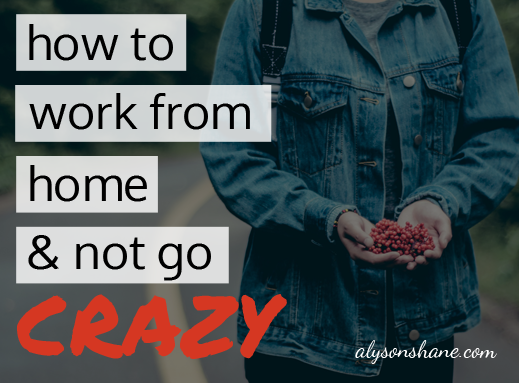
Get Dressed
Getting dressed is the difference between a "lazy Saturday in front of my laptop" and "I'm getting actual work done" mode. it might sound crazy, but stick with me here, there's some important reasons why this is actually a helpful and totally legitimate practice:
Clothes are symbolic, and affect how we feel about ourselves. When you put in the time to make yourself look nice you're more motivated to "get out there" and hustle, whether that means meeting a client, going somewhere, or even talking on the phone. In addition to that, getting dressed helps subconsciously compartmentalize areas of your life that can begin to blend together when you work from home.
Besides the mental difference between hanging out in your PJs and getting dressed, being fully dressed and ready to head out the door means that you can do exactly that - I can pop out to the store, to grab a coffee, or to go sit somewhere and work if I feel like it.
Personal aside: I have "power lipstick" that I put on before an important client call. I know it's silly, but wearing it makes me feel like a bombshell badass à la Meryl Streep in The Devil Wears Prada and definitely makes me feel more powerful and assertive.

Keep Your Work Area Separate
Disengaging from work mode into relaxing mode is way harder when you do both in the same space.
Currently I do all of my "office" work at my iMac, at a desk, in a computer chair, and try to relegate "downtime" (aka hanging out on social networks, reading for leisure, and writing) to sitting on the couch with my Macbook. Sometimes these lines blur - I'll work on my eBook from the couch, or write a blog post at my desk (like I'm doing now) by and large my 9-5 type work takes place at a separate area than my leisure time.
My guess is that it's a mental thing, but sitting on my super-comfortable couch with my feet up makes me feel less like I'm working... so I work less. I spend way more time slacking off if I try to work from the couch than if I'm art my desk. Additionally, I can "leave work" for the day by putting my iMac to sleep and shutting off my desk lamp - those are symbolic gestures that, for me, signal the end of my workday and a transition to hanging out and relaxing.
Figure Out When You're Most Productive
One of the biggest changes from going to working in an office to working at home is that you don't have to worry about being "on" all the time. What I mean by that is, you don't have to worry about looking busy 24/7 just in case your boss happens to walk by and see your screen. According to a salary.com article from 2014, 89% of employees say they "waste time" at work - whether that's checking their email, hanging out on Facebook, or loitering around the coffee machine; they're not sitting at their desks and being productive.
But what does "productivity" mean? For most employers, it means that you're plugging away at a task and that you're operating at the highest efficiency levels from the moment you arrive to the moment you leave the office. Realtalk: this just isn't the reality, and sitting at your desk and forcing yourself to try and operate at maximum efficiency all day is a surefire way to get next to nothing done.
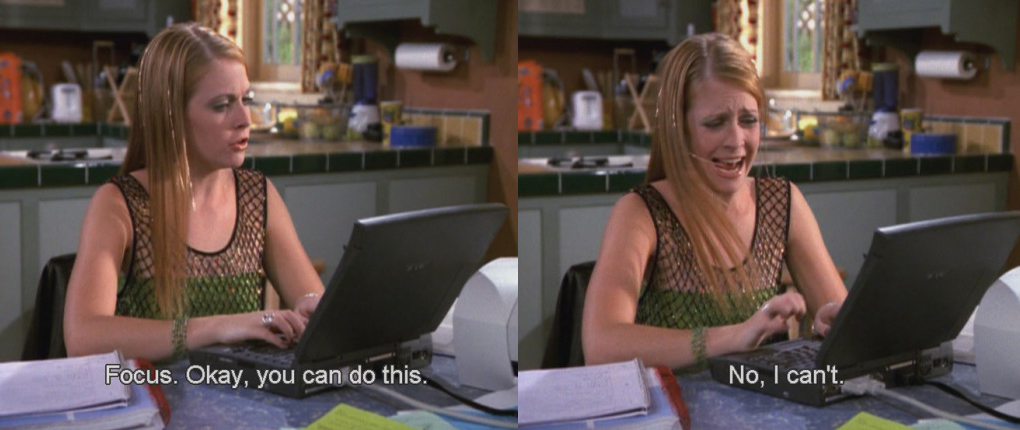
One of the great things about working from home is that you can set your own schedule according to when you're most productive, rather than trying to be productive all day (which rarely happens with any real level of consistency - we all need breaks, after all).
I know that I'm most productive early in the morning (8-11ish) and late in the afternoon (3-6ish), with a lull in-between most days, so I tackle my most pressing and important tasks during those two times - usually I try to handle client stuff in the AM, and do business development stuff (blogging, writing my ebook, etc) in the afternoon. That way I know I can get the most out of my day, and by having a little downtime I can make sure when I'm productive I'm as focused as possible.
Declutter Your Desk
Clutter is the enemy of productivity, and if you have to spend a ton of time searching through papers, looking for a pen that works, or rooting through old notes and files you're distracting yourself from what you should actually be focusing on: being productive.
I'm a bit of a cleanliness nut, so here's how I keep my desk organized and in a state of zen during the week:
- I only use one pen at a time. Actually, I rely pretty heavily on mechanical pencils, but I have a little box that I got from Magic Pony several years ago where all my pens and pencils live.
- Do a paper purge. I try to keep my desk as paper-free as possible, which means rounding up notes, papers, and receipts and putting them away. Additionally, if you want to claim something on a receipt as a business expense take a photo before you put it away. I do this weekly and it saves me so much hassle.
- Purge your desktop. Put unused files or photos in the trash bin and try to keep your computer desktop as clutter-free as possible. I generally only have my notebook, a pencil, and my phone on my desk when I'm working.
Find Reasons to Leave the House
This is a huge one, kids. It's way too easy to wake up, work, hang out, go to sleep, wake up, work, hang out, go to sleep, wake up... you get my drift. Especially during the winter months when sitting outside on the deck isn't an option it can be all too easy to wind up staying inside for days at a time, ordering all your meals in from SkiptheDishes and being glued to the computer screen.
Personally, I combat this by hitting the gym on a regular basis, which gets me out of the house, on the bus, and interacting with other human beings 3-4 times a week. Usually I'll stop by the grocery store on the way home for a little more face time with people aren't my boyfriend or my roommate or his girlfriend.
Don't Work in Bed
This should be self-explanatory, but just in case: don't bring your work into the same place where you sleep and snuggle up with your lover.
Do you have any tips for staying sane while working from home? I'd love to hear them!
